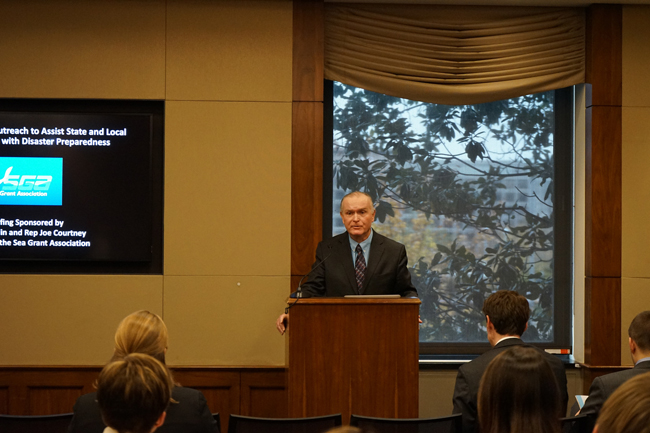Published for Stony Brook University's E-news Site, Happenings
Stony Brook, NY, November 17, 2017 - New York Sea Grant Director Bill Wise participated in a legislative briefing, “Using Science and Outreach to Assist State and Local Decision Makers in Disaster Preparedness and Public Safety,” on November 8 in Washington, DC, which was sponsored by Congressmen Lee Zeldin (NY) and Joe Courtney (CT).
Wise and others on the panel conveyed the importance of the National Sea Grant College Program (Sea Grant) to Congressional leaders. Specifically, he discussed the Coastal Storm Awareness Program (CSAP), funded with $1.8 million from the National Oceanic and Atmospheric Administration. This program was initiated after Superstorm Sandy to help understand the factors that influenced coastal residents’ actions related to storm warnings and to improve clarity of future warnings. The Connecticut, New York and New Jersey Sea Grant programs administered 10 social science research projects supported by CSAP. The programs targeted residents who are reluctant or too late to evacuate during storms like Sandy, newcomers who don’t understand the impacts of extreme storms and storm surge, and several Spanish-speaking communities that may need assistance in translating severe storm messaging and alerts.

New York Sea Grant Director Bill Wise introduces Congressman Lee Zeldin at the Congressional Briefing. Credit: Christopher Katalinas/National Sea Grant
“CSAP had its origins in the National Weather Service’s assessment of Superstorm Sandy,” said Wise. “Storm predictions were spot on, and still people died. The goal of CSAP is to find out why. As a result of CSAP’s integrated research program, we were able to find out how people get storm information, how they process that information and what factors influence their decisions. Based on the findings, the National Weather Service has taken action to improve storm-warning communication.”
CSAP is crucial for the future of our coastal communities, especially in light of further SBU Sea Grant research that shows Sandy was not a worst-case catastrophe.
More Info: Sea Grant
Sea Grant is a joint federal-state investment of 33 university-based programs that supports the health and resilience of the nation’s coastal communities (including the Great Lakes, Gulf of Mexico and communities on the Atlantic and Pacific coasts). New York Sea Grant, a cooperative program of the State University of New York and Cornell University, has its main office at Stony Brook University.
During 2015 to 2016, Sea Grant helped generate an estimated $575 million in economic impacts; created or sustained nearly 21,000 jobs; provided 534 communities with technical assistance on sustainable development practices; worked with about 1,300 industry, local, state and regional partners; and supported the education and training of almost 2,000 undergraduate and graduate students, yielding quantifiable economic, social, and environmental benefits at the national, regional, state and local levels.
View the trailer for Sea Grant’s Coastal Storm Awareness Program’s documentary: